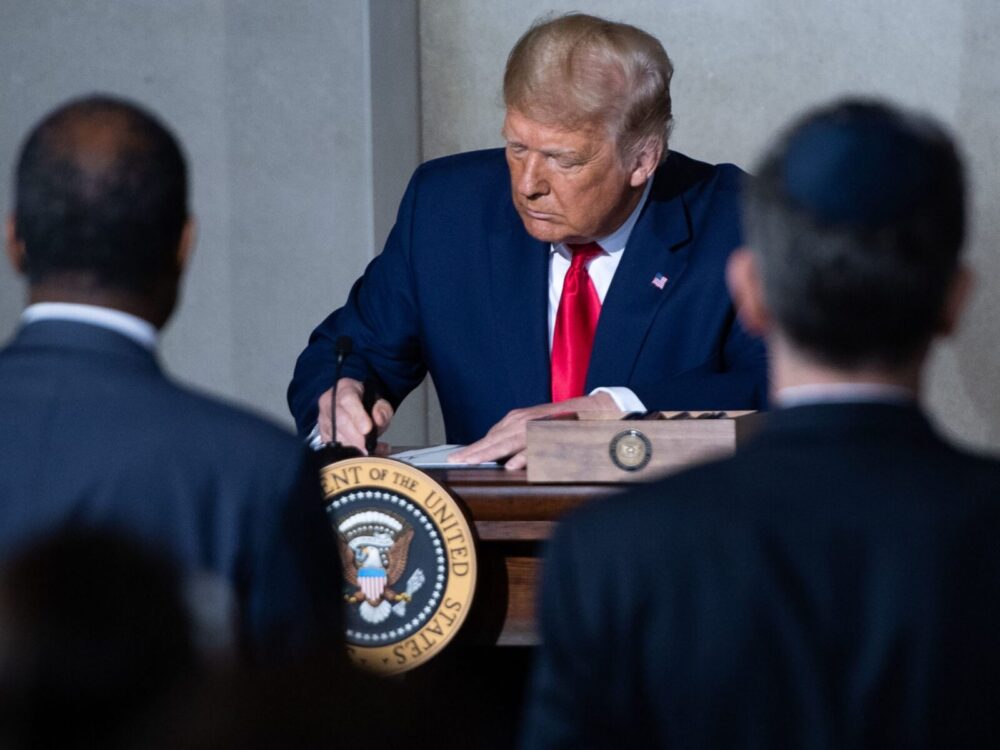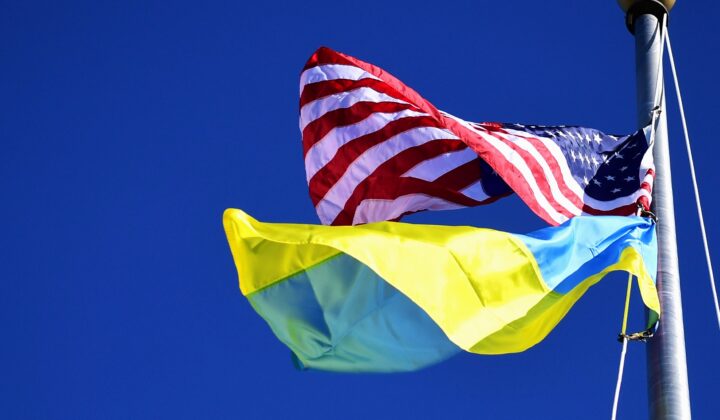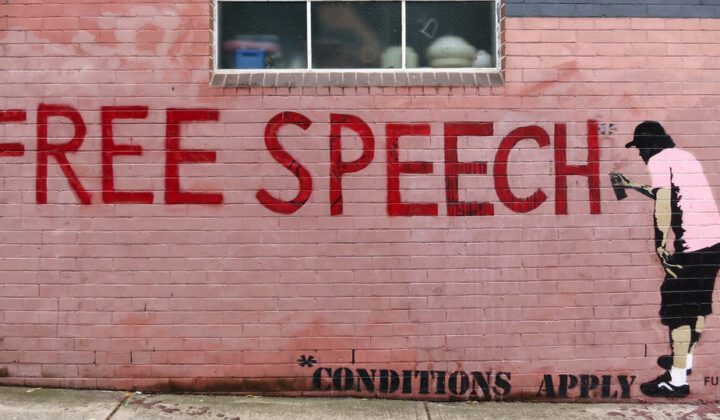
President Trump Attacks ‘Left-Wing Indoctrination’ in Schools, Calls for ‘Patriotic Education’ Instead
On Constitution Day last Thursday, President Trump gave a speech at the National Archives Museum criticizing “left-wing” educational developments that allegedly paint America as “a wicked and racist nation.” Citing examples such as the New York Times Magazine’s “1619 Project,” Trump claimed that liberals want to “rewrite American history to teach our children that we are founded on the principle of oppression, not freedom.” The President also attacked “critical race theory,” equating the teaching of it in schools to “child abuse in the truest sense of those words.”
Purportedly to counter these efforts, President Trump will soon sign an executive order to create the “1776 Commision,” which will push for a “pro-American curriculum” to teach our children to “love America,” not “be ashamed of their history.” The National Endowment for the Humanities, according to Trump, has already awarded a grant to help support this cause. Trump went on to say that this “patriotic education” initiative was inspired by the Rev. Dr. Martin Luther King, Jr.’s vision for a racially just America.
1. What’s wrong with criticizing the “1619 Project”?
Nothing, really. Both the “1619 Project” and Howard Zinn’s A People’s History of the United States, which Trump also criticized in his speech, arguably contain historical errors and were motivated, at least in part, by political ideology. For example, five prominent US historians wrote a letter to the NYT, expressing their concern with 1619’s claim that America declared independence from Britain “in order to ensure slavery would continue,” among other factual errors regarding the Declaration of Independence, Abraham Lincoln, and the Civil War. Zinn’s work, though undeniably popular, has been called out since its 1980 release by scholars for its over-reliance on anecdotal evidence and its avoidance of information that contradicts his “the people v. the rulers” narrative.
However, these were not President Trump’s arguments. It is one thing to criticize these specific works. It is quite another to, as the President did, threaten to defund California public schools that teach the “1619 Project” and institute a formalized, nationwide “patriotic” education program. Even if these works are significantly flawed, the answer is not to introduce an opposite political bias.
2. Where have we heard “patriotic education” before?
The language of the President’s “patriotic education” speech last week eerily echoes Vladimir Putin’s amendments to Russia’s education law in May: Putin sought to restore “a sense of patriotism and citizenship” as well as “respect for the memory of the defenders of the Fatherland” amongst children.
China is also no stranger to “patriotic education,” which has rapidly accelerated under the rule of Xi Jinping. Starting with “thought work” where toddlers are taught nationalist anthems in kindergarten, the government has constructed an education system that relentlessly teaches kids “to love the party, the country, socialism and the people.”
Although the specific contours of a “patriotic education” curriculum are still unknown, repeating phrases already touted by authoritarians is deeply unsettling. While we as a nation should absolutely invest more in civics education that emphasizes the importance of American founding principles, we should be wary of any curriculum that sets inculcating patriotism as its primary goal.
___
Young Americans are Ignorant of the Holocaust
Last week, a survey — commissioned by the Conference on Jewish Material Claims Against Germany — was released that exposed shocking ignorance among American youth about the Holocaust.
Among the most startling numbers are that nearly two-thirds of young Americans did not know 6 million Jews were killed in the Holocaust, 48% could not name one concentration camp and 36% believed that 2 million or fewer Jews were killed. 23% also believed that the Holocaust was a “myth, had been exaggerated or [they] weren’t sure.”
Although these new numbers are appalling, the lack of Holocaust knowledge among America’s youth had been well-established before — both in 2018 and earlier this year.
We can also look at these numbers in the context of a larger, and more disturbing, trend among younger Americans when it comes to a complete and utter lack of knowledge about history. It is this ignorance that leads 36% to say they approve of communism and over 25% to say that “choosing leaders through free elections” is “unimportant.” To top it off, 53% of college students want to prohibit “offensive” speech.
1. Why such ignorance about the Holocaust? What is being done about it?
Today, only 15 states require Holocaust education in schools. And, due to the lackluster quality of that education, ignorance remains even in states where Holocaust education is compulsory. 19% of young New Yorkers, for example, believe that Jews caused the Holocaust. This is despite the fact New York not only requires Holocaust education but also has the largest Jewish population in the country.
However, there are some encouraging numbers, too. 64% of young Americans believe that Holocaust education should be required. This means that while many are not getting the correct education, they want it.
This need, and desire, for better education on the Holocaust has been recognized by those in government. Representative Carolyn Maloney (D-NY) introduced the Never Again Education Act in January of this year. The bill allocates 10 million dollars to the U.S. Holocaust Museum to “develop and disseminate accurate, relevant, and accessible resources” in order to allow “educators [to] find curriculum materials.”
The bill passed through Congress with overwhelming support. President Trump signed the bill into law in May.
Although the bill signaled that those in power understand the need for better Holocaust education, much more must still be done.
2. What are the consequences of ignorance about the Holocaust and anti-Semitism?
In the past few years, there have been deadly shootings at multiple synagogues and a Kosher supermarket; there has been a deadly stabbing at a Rabbi’s house and countless assaults on Jews as they walk down the street in New York City. Attacks on Jews never disappeared in America, but they are now more visible than they had been for generations.
According to the FBI, 57% of anti-religious hate crimes in the US are targeted at Jews despite the fact that Jews make up less than 3% of the US population. Moreover, the rise in attacks has gone largely unreported by the media.
The recent rise in anti-Semitism — as well as anti-Semitc violence — should be considered a natural outgrowth, and result, of the lack of knowledge about Jews and the Holocaust. Because anti-Semitism is the world’s oldest conspiracy theory, it can only survive where ignorance is rampant. Inadequate education on the history of violence against Jews provides fertile soil for that ignorance to marinate and for anti-Semitism to thrive.
In Unprecedented Election, Courts Struggle with Voting Rights Cases
Tens of millions of first-time absentee voters. More than half a million rejected mail-in ballots just in the presidential primaries—nearly double the number of ballots rejected in the 2016 general election.
These unprecedented circumstances have catalyzed a barrage of voting rights litigation, the results of which could prove critical to the outcome of election this November. With the election slightly more than a month away, there remain more than 300 outstanding lawsuits across more than 44 states. The Republican National Committee recently doubled its election legal budget to a staggering $20 million, and the largest Democratic Political Action Committee is spending an astonishing $32 million.
The suits concern technical issues such as the dates by which ballots must be postmarked and received, the requirements for a ballot to be accepted, where ballots can be delivered, and more. They have been initiated by lawyers on both sides of the aisle, with Democrats generally suing to expand vote-by-mail programs and Republicans attempting to limit them.
Judges have issued mixed verdicts on the cases decided thus far. On Thursday, the Pennsylvania State Supreme Court issued a high-profile ruling rejecting a Republican effort to limit the counting of late ballots and remove statewide drop boxes and other “satellite” voting locations.
However, President Trump claimed the decision was a partial victory, praising the Court for ruling that clerks were not required to inform voters if their ballots were invalidated due to minor errors and requiring the use of a protective “secrecy envelope” for ballots to be counted.
Battleground states have been the site of other significant rulings that have gone both ways. Notably, on Thursday, a federal judge granted a request to halt operational changes within the US Postal Service that many have accused of delaying service, saying that “at the heart” of the actions was the goal of “voter disenfranchisement.”
1. What do these mixed results say about our democracy?
Normally, one of federalism’s great virtues is that it allows for policy innovation and experimentation; each state can serve as a “laboratory of democracy.”
However, with our established electoral process in upheaval, this also poses significant challenges. A messy, sprawling patchwork of differing state procedures and rulings presents the worrying prospect of mass disenfranchisement, confused voters, and bitterly contested results—a nationwide repeat of Florida in 2000. And in its rulings on the upcoming election, thus far, the Supreme Court has been highly deferential towards state election officials in the name of protecting local control, increasing the potential for disarray.
This litigation is not over mere technicalities; it could prove decisive in key swing states, and ultimately, the election. Recent litigation in Florida affected the voting rights of 774,000 former felons in a state whose 2018 Senate election was decided by 10,000 votes. A Pennsylvania election official said that more than 100,000 votes could be thrown out due to the secrecy envelope ruling; in 2016, Trump won the state by 44,000 votes. Justin Levitt, a professor at Loyola Law School, quips “the election administrator’s prayer is, dear Lord, let this election not be close.”
If you are voting, make sure to fill out your documents carefully and send them in as soon as possible so that your vote does not depend on the results of potential litigation.
If you would like to stay informed about the outcomes of the most important voting rights cases, click here. If you want to learn more about the deadlines for requesting and sending in ballots in your state, click here.
The famous George Santayana quote reads “those who do not remember the past are condemned to repeat it.” We hope the nation remembers the Election of 2000.





